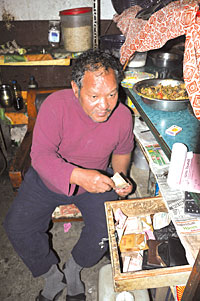 |
Sixty-year-old Maulidhan Moktan of Solukhumbu is one of many gamblers bankrupted by the casinos. He lost a total of Rs 45 million in 15 years. He makes a living now by running a cheap tavern outside the international airport in Kathmandu.
Back in the day, his high-season earnings from the Everest Plaza Hotel in Lukla and the Kathmandu Everest Base Camp Cargo Service used to exceeded Rs 70,000 a day. He squandered all his properties, including land in Kathmandu, in indulging his addiction to gambling. "All I have now is this bhatti," he says.
Tourist entrepreneur Sagar Kiranti (name changed) of Thamel lost Rs 15 million in 10 years. He would go to the casino whenever he came into any money. He gambled away as much as Rs 700,000 at a time. "Even after losing so much money, I have been able to get back onto my feet," he says.
Although Nepali citizens are legally barred from visiting casinos, Nepali customers outnumber foreigners in these places, and constitute the main source of their business. Real estate brokers, contractors, manpower operators and tourist entrepreneurs are frequently seen in casinos.
But it's not only rich people who haunt the casinos of Nepal. Taxi driver Bidur Karki of Baneswor developed an addiction to gambling in casinos, and gambled away the money his wife used to send him from Israel. He lost Rs 600,000 in six months. He borrowed money and sold his property to continue gambling so that he could get back the money he had lost.
His wife came to know about his addiction to gambling and stopped sending him money. With no one else willing to lend to him, Bidur was unable to visit casinos. His wife believed he had overcome his addiction and sent him another Rs 700,000 to start a business. He lost all the money in a single night. "I felt like I would have a fit. I went home, closed the doors and slept. I did not come out of my room for two days," he recalls.
Under SP Ramesh Kharel's tenure as chief of police in Kathmandu district, 90 Nepalis have been arrested from casinos and action has been taken against 500 people for running gambling dens.
The Gambling Act 2020 (1963) specifies six days of detention and a fine of Rs 200 for gambling, which amounts to nothing, says Kharel, as it doesn't deter anyone from visiting casinos. Instead, casinos have spurred a rise in the crime rate. In 2009, college student Khyati Shrestha was abducted and murdered by Biren Pradhan for ransom to pay back the money he had lost in casinos. Casinos have also become the favourite hangouts of kidnappers, conmen and thieves. They splurge their money on gambling and when they lose, they resort to any measure to get more money.
The first casino in Nepal was opened 42 years ago in Hotel Soaltee. After 1990, casino licenses became available, and now there are eight casinos in Kathmandu and two in Pokhara.
Note: Since this article was published in Himal Khabarpatrika, Nepal Police has issued arrest warrants against the operators of five casinos, charging them with allowing Nepali citizens to gamble on their premises.


